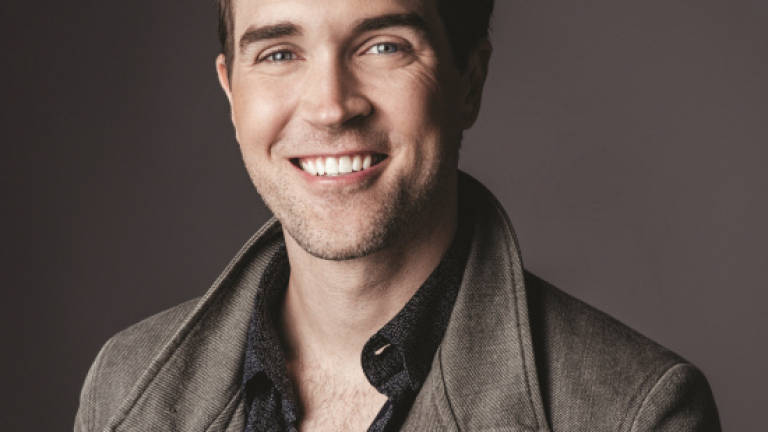A stab in the dark

FIRST-TIME novelist A.J. Finn has created a suspense thriller with enough twists and turns, that readers want to read his book The Woman in the Window repeatedly, just to figure out what they might have missed initially.
The protagonist, Dr Anna Fox, lives all alone in a large house and spends her time people-watching from her window, watching black-and-white classic films, or drinking herself into a stupor.
Anna suffers from agoraphobia, and is separated from her husband who also has custody of their only child.
When the Russell family moves in next door, Anna befriends their son, who seems to be hiding a secret.
One day after lots of wine and pills, Anna sees a woman being killed. But when the police arrive, they don't find anything and dismisses it as Anna hallucinating.
Anna is determined to find out the truth, but in doing so, her own secrets are revealed.
A.J. Finn is actually Daniel Mallory, a former book critic who have written for the Los Angeles Times, the Washington Post, and the Times Literary Supplement.
He is also an executive editor for William Morrow, a highly-regarded publishing company.
In an email interview, when asked why he used a pseudonym as his real name would have helped him open doors faster, Mallory said: "Ah, but that's exactly why I didn't wish to use my real name! I wanted editors to judge the book on its own merits, without taking into account its authorship.
"I also feared – wrongly, as it turned out – that no one would buy the novel, in which case, I didn't want anyone to know that I'd written it."
"Beyond that, I thought it might discombobulate the authors whom I published if they were to see their editor's name on a book of his own."
Mallory began writing the book in September 2015, and only completed it a year later.
He said: "I hadn't dabbled in fiction since my schooldays, but I've written plenty of academic papers and book reviews. So I assumed that the ins and outs of sentence-level composition – the writing – would pose no problem; it was the characterisation and plotting that daunted me.
"To my surprise, Anna took shape very quickly, like a figure approaching through mist, dragging her story with her pretty much intact. It was the writing that proved challenging!"
"It turns out that simply getting a character from the sofa to a window can, in fact, be a tricky business."
Considering how the premise could be initially dismissed as a rehash of Alfred Hitchcock's classic film Rear Window, did Mallory had any apprehensions of publishers dismissing it before reading the whole book?
"The book builds slowly throughout the first quarter; this is very much by design–I sought to acclimate the reader to the rhythms and routines of a life spent indoors–but I appreciate that the story doesn't strike out in its own direction until about page 100.
"My hope is that readers will find the character and her circumstances sufficiently intriguing to want to continue spending time in Anna's house."
As to why agoraphobia instead of a physical problem, Finn said: "Three reasons. First off, as someone who has struggled with severe depression throughout his adult life, I wanted to explore the issue of mental health, a problem that too few people are willing to engage and discuss.
"I hoped to demonstrate that psychological impairment can be just as debilitating, if not more so, than a physical handicap.
"Secondly, I was interested to see Anna grapple with and ultimately overcome her demons. This seemed to me a more compelling journey than simply waiting for an injured limb to heal.
"And finally, I thought that agoraphobia served as an effective metaphor for the character's situation: She is locked in mentally just as she is locked in physically."
There is a character in the book that many thought was going to be a love interest and perhaps save Anna, but Finn choose to go another route.
"You know, an American editor said the exact same thing when she was bidding on the rights. Hand-to-heart, this never occurred to me!
"At no point did I imagine that [this character] might help or rescue Anna; it was important to me that she become her own saviour."
"This is for two reasons: I wanted to demonstrate that a disadvantaged person–in Anna's case, laid low by depression–can still create her own salvation; and also, I find I get quite annoyed by novels (and there are many of them) in which a man saves a woman in peril. Women are perfectly capable of taking care of themselves, and Anna's no exception."
He said that it has yet to sink in that he is a best-selling author in 40 territories, has a film deal, making a debut at number one on the New York Times bestseller list, and so on.
"I am in a state of happy, grateful disbelief. Of course, this means I'd better outdo myself when it comes to the second book!"
As for his second book: "My next book is nearly finished. It's another psychological thriller, this time set in San Francisco, one of America's most mysterious and romantic cities."